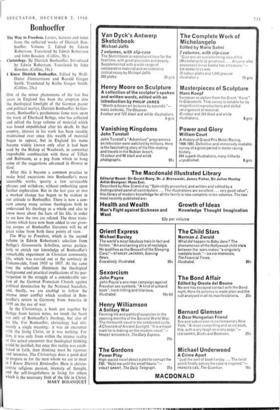Bonhoeffer
The Way to Freedom. Letters, lectures and notes from the collected works of Dietrich Bon- hoeffer. Volume 2. Edited by Edwin Robertson. Translated by Edwin Robertson and John Bowden. (Collins, 30s.) Christology. By Dietrich Bonhoeffer. Introduced by Edwin Robertson. Translated by John Bowden. (Collins, 18s.) I Knew Dietrich Bonhoeffer. Edited by Wolf- Dieter Zimmermann and Ronald Gregor Smith. Translated by Kiithe Gregor Smith. (Collins, 25s.) ONE of the minor phenomena of the last five years in England has been the eruption into the theological limelight of the German pastor and political martyr, Dietrich Bonhoeffer. In Ger- many, Bonhoeffer's posthumous fame rests upon the work of Eberhard Bethge, who has collected and edited the large volume of material which was found unpublished after his death. In that country, interest in his work has been steadily maintained ever since this wealth of material began to appear, but in England his name became widely known only after it had been used by the Bishop of Woolwich, in somewhat improbable combination with those of Tillich and Bultmann, as a peg from which to hang some of the suggestions advanced in Honest to God.
After this it became a common practice to make brief excursions into Bonhoeffer's more accessible works, quarry a few serviceable phrases and withdraw, without embarking upon further exploration. But in the last year or two a marked change has begun to be evident in our attitude to Bonhoeffer. There is now a con- cern among many serious theologians both to understand his theology as a whole and also to know more about the facts of his life, in order to see how the two are related. The three trans- lations which have now been added to our grow- ing corpus of Bonhoeffer literature will be of great value from both these points of view.
The Way to Freedom, which is the second volume in Edwin Robertson's selection from Bethge's Gesamnnielte Schrif ten, serves particu- larly to enrich our knowledge of Bonhoeffer's remarkable experiment in Christian community life, which was carried out at the seminary in Finkenwalde, from 1935 to 1937. At the same time the selections illuminate the theological background and practical implications of his par- ticipation in the struggle of a considerable sec- tion of the German Protestant Church against political domination by the National Socialists, and, finally, we are enabled to follow the intense inner conflict which resulted in Bon- hoeffer's return to Germany from America in 1939 on the eve of war.
In the Christology, a book put together by Bethge from lecture notes, we touch the heart not only of Bonhoeffer's theology, but also of his life. For Bonhoeffer, christology had ulti- mately a single meaning: it was an encounter vdth the living Christ, or it was nothing. For him, it was only from within the intense reality of this actual encounter that theological thinking could be justified, but once this reality was estab- lished in faith, then thinking must be rigorous and intensive. The Christology does a good deal to prepare us for the man whom we are to meet in / Knew Dietrich Bonhoeffer. Here is christo- centric religious passion, intensity of thought, and the self-forgetfulness in living for others which is the necessary fruit of the life in Christ.
MARY BOSANQUET


































 Previous page
Previous page